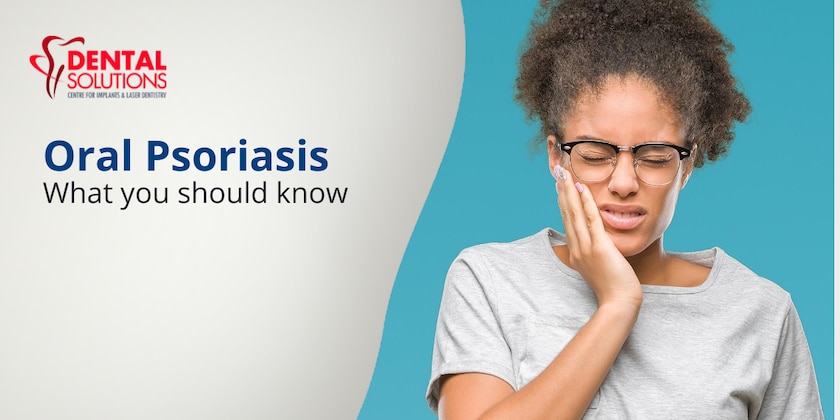What is Oral Psoriasis?

What is Oral Psoriasis?
Oral psoriasis is a type of psoriasis that affects the mouth and the areas around it, such as the lips and the inside of the cheeks. It is a chronic autoimmune condition that causes red, scaly patches to form on the skin. Like other forms of psoriasis, oral psoriasis is not contagious and cannot be spread from person to person.
Symptoms of oral psoriasis may include red patches on the skin inside the mouth, cracked or bleeding lips, and a burning or tingling sensation in the affected areas. The condition can be treated with medications prescribed by a doctor, as well as good oral hygiene and a healthy lifestyle.
Symptoms of Oral Psoriasis
The symptoms of Oral psoriasis include
- Red patches or lesions on the tongue, gums, or inner cheeks
- Burning or soreness in the mouth
- Dryness or cracking of the lips
- Difficulty swallowing or eating
- Swollen or tender lymph nodes in the neck
- Thick, white patches on the tongue or inside of the cheeks (oral leukoplakia)
- Loss of taste or altered sense of taste
- Bleeding gums or mouth sores
- Foul breath or taste in the mouth.
Oral psoriasis is often linked to other conditions, such as plaque psoriasis, which affects the skin. People with oral psoriasis may also have a higher risk of developing other autoimmune conditions, such as Crohn's disease or inflammatory bowel disease. Additionally, oral psoriasis can lead to complications such as infection, tooth loss, and difficulty eating or swallowing.
How is oral psoriasis diagnosed?
Oral psoriasis is typically diagnosed by a dentist or doctor based on the appearance of the mouth and any symptoms the person is experiencing. They may also perform a biopsy of the affected tissue to confirm the diagnosis.
In some cases, additional tests may be needed to rule out other conditions that can cause similar symptoms like
- Oral lichen planus: an autoimmune disorder that affects the mouth
- Oral candidiasis: an infection caused by the yeast Candida
- Oral thrush: a fungal infection of the mouth
- Leukoplakia: a precancerous condition that causes white patches on the oral mucosa
- Oral cancer: a type of cancer that affects the mouth
- Herpes simplex virus: a viral infection that can cause sores in the mouth
- Behcet's disease: a rare autoimmune disorder that can affect the mouth and other parts of the body.
Treatment for Oral Psoriasis
Treatment options for oral psoriasis may include:
- Topical medications: ointments or gels applied directly to the affected areas of the mouth
- Phototherapy: using light therapy to help reduce inflammation and control symptoms
- Systemic medications: oral or injectable medications that work throughout the body to control the immune system and reduce symptoms
- Corticosteroids: powerful anti-inflammatory medications that can help control symptoms
- Biologic medications: targeted medications that specifically target the immune system to reduce inflammation and control symptoms.
In addition to these treatments, it is important for people with oral psoriasis to maintain good oral hygiene and avoid triggers that can exacerbate their symptoms, such as tobacco use and alcohol consumption.
You might also want to know about psoriasis as a overall skin condition
What happens if oral psoriasis is left untreated?
If oral psoriasis is left untreated, it can lead to a number of complications. These may include:
- Infection: oral psoriasis can increase the risk of infection in the mouth, which can lead to further complications such as tooth loss or abscesses.
- Difficulty eating and swallowing: oral psoriasis can cause inflammation and discomfort in the mouth, making it difficult for people to eat and swallow food.
- Poor oral hygiene: untreated oral psoriasis can lead to a build-up of plaque and bacteria in the mouth, which can cause tooth decay and gum disease.
- Social and emotional effects: oral psoriasis can cause self-consciousness and embarrassment, which can lead to social isolation and psychological distress.
Therefore, it is important to seek treatment for oral psoriasis to prevent these complications and manage symptoms effectively.
Does Oral psoriasis lead to cancer?
Oral psoriasis itself does not directly lead to cancer. However, certain factors that can be associated with oral psoriasis, such as smoking and excessive alcohol consumption, can increase the risk of oral cancer. Additionally, untreated oral psoriasis can cause a condition called oral leukoplakia, which is a precancerous condition that can develop into cancer if left untreated. Therefore, it is important for people with oral psoriasis to seek regular check-ups and treatment to prevent the development of oral cancer.
Oral Psoriasis prevention Tips
To prevent oral psoriasis, the following tips may be helpful:
- Avoid known triggers: if you know that certain foods, stress, or other factors trigger your oral psoriasis, try to avoid or manage these triggers to prevent flare-ups.
- Maintain good oral hygiene: brush and floss your teeth regularly to prevent the build-up of bacteria and plaque, which can exacerbate oral psoriasis.
- Avoid tobacco and alcohol: smoking and excessive alcohol consumption can increase the risk of oral psoriasis and other complications.
- Seek regular check-ups: visit your dentist or doctor regularly to monitor your oral health and catch any potential issues early on.
- Manage underlying conditions: if you have other conditions, such as plaque psoriasis or Crohn's disease, work with your healthcare provider to manage these conditions effectively to prevent oral psoriasis.
In conclusion, oral psoriasis is a rare form of psoriasis that affects the mouth and can lead to discomfort and difficulty eating and speaking. It is important to see a dentist or doctor if you suspect you have oral psoriasis, as it can be treated with a combination of medications and lifestyle changes. Additionally, it is important to practice good oral hygiene and maintain a healthy diet to help manage the symptoms of oral psoriasis. Remember to always consult with a medical professional before making any changes to your treatment plan.
